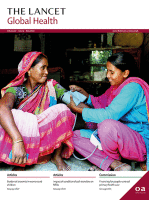External publications

Ethical failures in global health research: violations of Sustainable Development Goal 8, decent work for all
Bangura, Ibrahim / Ananya Chakraborty / Ana Garcia-Hernandez / Lennart Kaplan / Jana Kuhnt et al.External Publications (2022)
in: The Lancet Global Health 10 (5), e619
DOI: https://doi.org/10.1016/S2214-109X(22)00077-8
Open access
International collaborations are indispensable in global health research, and have great potential to be harnessed in a beneficial and fruitful way. However, to date, such collaborations have all too often been characterised by iniquitous and exploitative dynamics that disempower actors from low-income and middle-income countries. Data collection is heavily reliant on the work of local interviewers, gatekeepers, and translators, because of their fluency in the local language and their natural access to and trust within target communities. Despite having such a crucial role in generating the data, local researchers are mostly positioned at the lowest hierarchical level of research teams and systematically excluded from important stages of the scientific process. In addition, these researchers are commonly employed on short-term contracts without adequate health and social insurance. Many research projects operate on short-lived and ad hoc organisational structures that inadequately address the institutional, political, and macroeconomic challenges in the target country. Collecting data in high-risk and deprived settings—alongside poor project-level support infrastructure—can have particularly detrimental effects on the mental health and physical wellbeing of local researchers. Improper work conditions are further exacerbated at the intersectionality with poverty and gender. In low-income and middle-income countries with high unemployment rates and low levels of tertiary and secondary education, local research staff are in a weak position to negotiate their salaries—a set-up that can incentivise economic exploitation and inadequate remuneration.Female research staff in particular can be exposed to indecent working conditions, including sexual harassment when doing fieldwork and limited access to safe sanitation facilities when menstruating during fieldwork and to welfare nets such as paid leave during pregnancy and motherhood. Ironically, although global health research is carried out under the premise of promoting health and wellbeing in target communities, it can fail to fulfil these goals where its own research staff is concerned, therefore compromising the ethical integrity of global health research altogether. We conclude with an urgent call for systemic change. Individual researchers are forced into existing institutional frameworks and have a limited capacity to become champions of change. The responsibility to enforce ‘safe and secure working environments’ (Sustainable Development Goal 8.8) in global health data collection lies with research institutions and donors. Specifically, they need to demand adherence to standardised guidelines on safety and employment conditions for local research staff, including minimum salary requirements, provision of social security schemes, sick and maternity leave arrangements, implementation of safety protocols, adequate working hours, and access to psychological counselling.
Contact
Cornelia Hornschild
Publication Coordinator
E-mail Cornelia.Hornschild@idos-research.de
Phone +49 (0)228 94927-135
Fax +49 (0)228 94927-130
Alexandra Fante
Librarian/ Open Access Coordinator
E-Mail Alexandra.Fante@idos-research.de
Telefon +49 (0)228 94927-321
Fax +49 (0)228 94927-130




![[Translate to English:] Photo: Alexandra Fante, Bibliothekarin/Open Access-Koordinatorin](/fileadmin/_processed_/f/0/csm__c_Deutsches-Institut-fuer-Entwicklungspolitik_Fante_94ce4fa1ba.jpg)